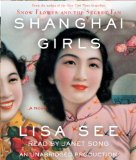Shanghai Girls: A Novel, by Lisa See (Read by Janet Song)
They were "Beautiful Girls" in 1937 Shanghai, girls whose provocative poses on calendars and advertisements earned them celebrity status in the cosmopolitan city along with a small amount of money. The money was initially of little consequence because they are also the privileged and pampered daughters of a successful rickshaw business owner. Their world of couture clothing and nightly partying changes abruptly when their father's gambling losses causes him to sell them as wives for the sons of a Chinese American. Not wanting to be forced to go to America with their new husbands and afraid of retaliation because of their father's gambling debts, they and their mother run away from their beloved Shanghai. Japanese bombs, murdering thieves, and marauding soldiers all confront the sisters as they fight to stay alive. Realizing it's their only hope for survival as war decimates their country, Pearl and May join their husbands in America where for the next two decades they face different kinds of battles.
Lisa See's Shanghai Girls is an absorbing account of the lives of two 20th century Chinese women, first in China and then in the United States. Their privileged status in Shanghai did not prepare them for the hardships they face in Los Angeles, but they prove adept at adjusting to performing menial labor in a sometimes hostile environment. In addition to giving a historical account of China and Japan's conflicts prior to World War II, See offers a Chinese cornucopia of folklore, superstitions, traditions, beliefs and sayings. Quaint expressions such as "porcelain with scars" to describe a prostitute generously populate the lyrical prose. Shanghai Girls is also a study of the unique problems each generation faces in an immigrant family. Her belief in the power of zodiac creatures inspires scorn in her modern, American-born daughter, while Pearl confesses that "We raised our children to be American, but what we really wanted were proper Chinese sons and daughters."
Told in the first person from the older
sister, Pearl's, point of view, Janet Song's narration
is so effective that by the end of the book, the listener
feels like an intimate friend of Pearl and her family.
Not only does the listener feel like a friend, but like
a historical insider of the time, someone who understands
the significance of "Gold Mountain men" and
"paper sons." This audio book allows listeners
to look at the paranoia surrounding Chinese immigration
of the 50s from both the United States government and
Chinese-American citizens' perspectives. It is an excellent
reminder that things are not always what they seem.
How many of us have looked at someone and assumed that
we know what his or her life is like? Who would have
observed the humble May and Pearl in post-war Los Angeles
and believed that once they had been Shanghai Girls…Beautiful
Girls? Highly recommended for its compelling story,
supported by rich and important historical content.
Ruth
Mormon
7/10/09

